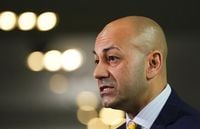In a surprising announcement on May 7, 2025, Yukon Premier Ranj Pillai declared that he will resign as leader of the Yukon Liberal Party and will not seek re-election in the upcoming territorial election, which must be held by November 3. Pillai, who has served as premier since January 2023, expressed that his time in this role has been a significant honor but concluded that it is time for a change.
During a press conference, Pillai reflected on his political journey, stating, "It is truly an honour — the greatest honour of my life — but my time in this role has come to an end." He plans to remain in office until a new leader is selected, emphasizing his commitment to the territory during the transition.
Pillai's political career began in 2003 when he started volunteering for the Yukon Liberal Party, eventually becoming its president. His first electoral victory came in 2009 when he was elected to the Whitehorse City Council, making history as the first elected councillor north of 60 who looked like him. In 2016, he was elected to the Legislative Assembly representing the Whitehorse riding of Porter Creek South, contributing to the Liberal Party's significant victory that ended 14 years of Yukon Party rule.
As premier, Pillai faced numerous challenges, including calls from the opposition Yukon Party for an election since he took office. The Yukon Party's spokesperson described his resignation as a "surprise" and criticized the Liberal government for plunging the territory into record-setting debt and overseeing the worst-performing economy in 2024. They also noted the strain on the healthcare system and rising crime rates, stating that Pillai's departure leaves the territory "essentially leaderless" at a critical time.
In contrast, NDP Leader Kate White, who has supported the minority Liberal government through a confidence and supply agreement, acknowledged her good working relationship with Pillai but hinted at a shift in the political landscape. "This resignation really shows that this election is a two-party race," she stated, referring to the competition between the Yukon NDP and the Yukon Party.
Pillai's decision to step down comes amid broader political shifts across Canada, with other provincial leaders, such as Andrew Furey of Newfoundland and Labrador and Dennis King of Prince Edward Island, also resigning earlier this year. His leadership has been marked by efforts to improve healthcare recruitment and address potential trade disruptions stemming from U.S. tariffs.
Reflecting on his tenure, Pillai highlighted achievements such as the Dempster Fibre Project, which brought telecommunications redundancy to the North, and the establishment of Yukon University, the first university in the North. He expressed pride in the government's accomplishments and the importance of reconciliation efforts during his time in office.
As Pillai prepares to step down, he has also expressed a desire to spend more time with his family, acknowledging the sacrifices they have made during his political career. He humorously mentioned the possibility of joining the Canadian Armed Forces, noting that he has a small window to serve in uniform before turning 53.
The Yukon Liberal Party's executive is set to meet soon to discuss the process for selecting a new leader, which will include planning a leadership convention and outlining the requirements for potential candidates. This leadership transition comes at a crucial time, as Yukoners prepare for the upcoming territorial election.
In conclusion, Ranj Pillai's resignation marks a significant moment in Yukon politics, with implications for the future direction of the territory as it heads towards an election that will shape its leadership and policy priorities.





